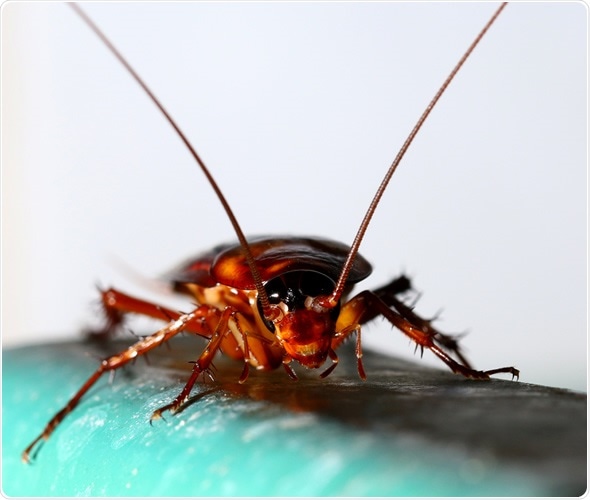Cockroaches are among the commonest causes of allergy in the Hispanic and African American communities in the United States, and this is mostly associated with relatively higher exposure rates.
The best known cockroach species are Blatellagermanica and Periplanetaamericana and both are known to cause both asthma and allergic reactions in sensitive individuals.

Image Copyright: chaipanya / Shutterstock
Symptoms
When cockroach exposure occurs in early infancy, wheezing and asthmatic attacks are often the main consequences in allergic infants.
Symptoms of cockroach allergy range from allergic rhinitis, with predominantly nasal symptoms, to asthmatic wheezing leading to more episodes of hospitalization and absenteeism from work.
Mechanism of Allergy
Cockroaches produce a variety of sensitizing proteins such as Bla g4 and Bla g5. The risk of developing asthma is maximum when a high exposure to cockroach allergens is associated with cockroach allergy.
Neither of these factors is responsible for asthma by itself. When cockroach allergens were inhaled, bronchoconstriction occurred in such patients.
Proteases in cockroach remnants may degrade the epithelial barrier in the human airways, allowing for easier penetration of the allergens and immune activation. Both innate and adaptive immunity is involved, resulting in a full-scale hypersensitivity reaction.
Cockroach allergy may be modulated by genetically determined susceptibility, which may be the reason why all people exposed to high levels of cockroach allergens do not develop cockroach allergy.
Early, consistent, and intensive exposure to cockroach proteins, especially in early life, results in asthma and allergies. Thus, children with a positive skin test are three times as likely to be hospitalized, to require more visits to healthcare professionals, and to miss more school days than non-allergic children living in the same environment.
Diagnosis and Treatment
A diagnosis of cockroach allergy is usually made on the basis of clinical symptoms of respiratory hypersensitivity along with a positive response to skin tests for cockroach allergens such as Bla g1.
At first, researchers found that four allergens (Bla g1, Bla g2, Bla g4 and Bla g5) are sufficient to diagnose 95 percent of cases. However, today’s best practice suggests a diagnostic yield of up to approximately 50 or 66% of affected individuals with the use of Bla g 1 with or without Per a 1, Bla g 2, Bla g 4, Bla g 5, and Bla g 7, with or without Per a 7.
Recombinant cockroach proteins produced by cloning techniques are used for greater reproducibility. Determining serum IgE levels in vitro is another diagnostic method used.
Treatment consists of frequent meticulous cleaning out of cockroach-infested areas to remove cockroach parts. This may require professional pest control. Immunotherapy is a method that has shown promise in producing desensitization.
Another approach involves the use of the monoclonal anti-human IgE antibody Omalizumab. This drug lowered the incidence of asthma exacerbations by over 70% in patients with cockroach allergy who were exposed to cockroach allergens, besides relieving symptoms and reducing the mean dosage of steroids, or even removing the need for use of steroids.
References
Further Reading
Last Updated: Feb 26, 2019